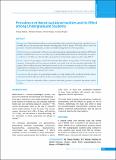Please use this identifier to cite or link to this item:
https://hdl.handle.net/20.500.14356/1182Full metadata record
| DC Field | Value | Language |
|---|---|---|
| dc.contributor.author | Muskan, Vitasta | - |
| dc.contributor.author | Shrestha, Ramesh | - |
| dc.contributor.author | Prasad, Pravin | - |
| dc.contributor.author | Prasad, Archana | - |
| dc.date.accessioned | 2023-05-02T07:22:46Z | - |
| dc.date.available | 2023-05-02T07:22:46Z | - |
| dc.date.issued | 2021 | - |
| dc.identifier.citation | MuskanV., ShresthaR., PrasadP., & PrasadA. (2022). Prevalence of Menstrual Abnormalities and its Effect among Undergraduate Students. Journal of Nepal Health Research Council, 19(04), 693-399. https://doi.org/10.33314/jnhrc.v19i04.3635 | en_US |
| dc.identifier.issn | Print ISSN: 1727-5482; Online ISSN: 1999-6217 | - |
| dc.identifier.uri | http://103.69.126.140:8080/handle/20.500.14356/1182 | - |
| dc.description | Original Article | en_US |
| dc.description.abstract | Abstract Background: Menstrual abnormalities are menstrual problems that women face during their reproductive years. Globally, they are the most prevalent disorders affecting quality of life in females. This study aimed to assess the prevalence of menstrual abnormalities, its effects and health seeking behaviour of the respondents. Methods: A cross-sectional study of 30 days was conducted among the undergraduate female students of BP Koirila Institute of Health Sceince who were more than 18 years and had attained their menarche. Total number of responses recorded were 137. Data was collected online via google forms and descriptive analysis was done using SPSS 23. Results: Out of 137 participants, 94.89% had menstrual abnormalities. Among which, 75.38% females sought treatment. Dysmenorrhea and Pre-menstrual syndrome were found to be the most prevalent abnormality. The quality of life was affected in most of the females in terms of lack of concentration in study (91.54%), missing the opportunity for socialization (95.39%), inability to perform physical exercises (82.31%), extra hours of confinement to bed (38.46%) and unable to attend lectures (30%). Conclusions: The prevalence of menstrual abnormalities were high. Quality of life was affected in all the subjects with menstrual abnormality but only few of them were seeking treatment with a professional doctor. Keywords: Menstrual abnormality effects; menstrual abnormality prevalence; menstrual abnormality medical students. | en_US |
| dc.language.iso | en | en_US |
| dc.publisher | Nepal Health Research Council | en_US |
| dc.relation.ispartofseries | Oct-Dec, 2021;3635 | - |
| dc.subject | Menstrual abnormality effects | en_US |
| dc.subject | menstrual abnormality prevalence | en_US |
| dc.subject | menstrual abnormality medical students | en_US |
| dc.title | Prevalence of Menstrual Abnormalities and its Effect among Undergraduate Students | en_US |
| dc.type | Journal Article | en_US |
| local.journal.category | Original Article | - |
| Appears in Collections: | Vol. 19 No. 04 (2021): Vol 19 No 4 Issue 53 Oct-Dec 2021 | |
Files in This Item:
| File | Description | Size | Format | |
|---|---|---|---|---|
| 3635-Manuscript-26774-1-10-20220313.pdf | Fulltext Download | 257.8 kB | Adobe PDF |  View/Open |
Items in DSpace are protected by copyright, with all rights reserved, unless otherwise indicated.
